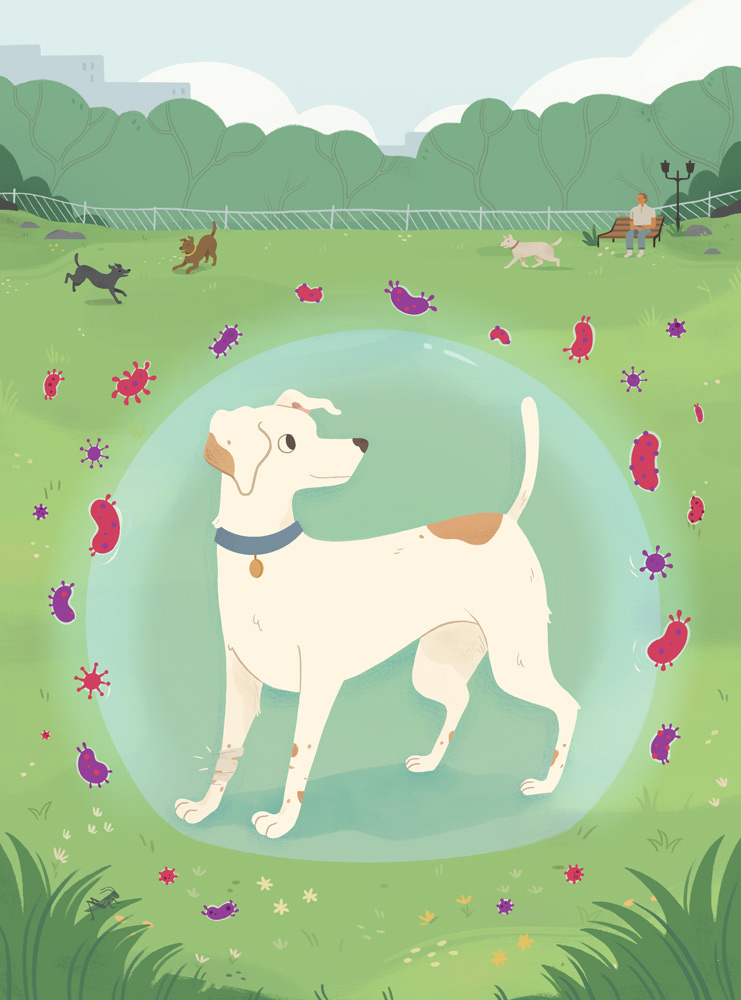

Worried about vaccines?
Titer Testing: What It Is and Why You Should Consider It. Does your dog really need to be vaccinated? Titer tests allow you to avoid over-vaccination while ensuring your dog is still protected
Patti Thomas had no reason to believe that her one-year-old Boston Terrier/French Bulldog mix, Jasper, wasn’t healthy.
She was doing all the right things. He’d had an updated vaccine in November 2014. Shortly afterwards, the Rumford, ME resident noticed that Jasper was passing dark urine. Always cautious, Patti called the vet, who took a urine sample.
“The vet came back in to tell me that I have a very sick dog on my hands,” says Patti. “He diagnosed him with immune-mediated hemolytic anemia (IMHA, a vaccine-triggered autoimmune disorder). We immediately started him on medications and started taking him for regular blood tests to check his blood cell count.”
Patti, who had “initially believed it to be a urinary tract infection,” was shocked. “It is so hard seeing them sick and not being able to fix it,” she says. “My pups are like my children. At one point, he was referred to a specialist two hours away from us. We could never really get his medications to stabilize him. He'd have a good day one day and look awful the next.” Eventually, his organs started shutting down, and, just short of two years old, Jasper died on the way to the emergency vet on January 15, 2015.
“Given the timeline of how and when things happened, the vet does feel that it was likely triggered by the vaccine that he received on November 9, 2014,” says Patti. She learned about titer tests shortly afterwards, and began to research vaccines and pets and over-vaccination. She was particularly worried for Jasper’s littermate, Jade, and, concerned she might have the same reaction, had her titer tested for DHPP, one of the “core” vaccines that helps prevent four different viruses in dogs: canine distemper, infectious hepatitis, parainfluenza, and parvovirus.
Illustration by Nicolle Lalonde
When the tests showed that Jade had immunity to the illnesses she was tested for, Patti opted to not have her re-vaccinated. “Having Jade's titer test did set my mind at ease.”
Pet parents—and veterinarians—have become increasingly wary of the health risks associated with overvaccination.
There are many benefits to vaccination. Vaccinating animals protects not only the individual pet receiving the vaccine, but the greater community against the spread of infection. But there are downsides to over-vaccinating as well, such as triggering illnesses.
That’s where a titer test—sometimes called serum vaccine antibody titering—comes in. “Titer testing can be used to determine if your pet has been exposed to a natural infection, and it can also be used to see if your pet has responded appropriately to a vaccine, by ramping up the production of antibodies in an effort to prepare a defense mechanism should a natural infection enter the body,” says Dr. Bloom. They are most commonly used not to replace initial vaccines but rather to assess where revaccination (a “booster shot”) is needed. A titer test is essentially a blood test measuring the existence and level of antibodies to disease in blood. Antibodies are produced when an antigen (like a virus or bacteria) provokes a response from the immune system. This response can come from natural exposure or from vaccination. The titer levels show how many times blood can be diluted before no antibodies are detected. If the titer levels are high enough, it shows that the dog has sufficient immunity and vaccination is unnecessary. In many cases, vaccinating is much cheaper than titer testing, but titer tests allow you to check if your dog indeed needs to be revaccinated before exposing him to the potential risks vaccines carry.
The most common titer tests for dogs look for antibodies in parvovirus, distemper and rabies, and can help pet parents, vets, groomers, kennel owners, and other people who work with dogs learn about animals with unknown vaccination history, or decide if their dogs need additional vaccinations, as titers can show the actual immune response.
All that is required is a simple blood draw done a minimum of 14 days after a vaccine. A titer test performed on the blood drawn can tell you if a previous vaccine is still protecting your dog and if your dog’s immune system still remembers the disease by producing antibodies. They can be used to help minimize the risks of both infectious diseases and unnecessary vaccinations by telling you if a previous vaccine is still protecting your dog. Immunity can result from a previous vaccine or if a dog has had the disease in the past. Either way, a high titer means your dog is protected and that you do not need to revaccinate.
One of the foremost experts on titer testing, Dr. W. Jean Dodds, DMV and founder of Hemopet, the U.S.’s first non-profit animal blood bank and hemopet.org, suggests titer testing your dog every three years for both distemper and parvovirus. “Any measurable titer to a vaccine including distemper and parvovirus means that the dog has specific committed immune memory cells to respond and afford protection upon exposure. It really doesn’t matter how high the titer result is as long as it measures something,” she writes.
“I think that vaccinating a dog for a disease that it is already immune to is potentially damaging
to their immune system.”
“In my practice, I use titers to determine if a dog needs a booster for distemper, parvo or rabies,” says Dr. Peggy Hahs Roberts, owner of Sierra Animal Wellness Center of Colfax, CA. “I think that vaccinating a dog for a disease that it is already immune to is potentially damaging to their immune system. I just had a new patient who is 14 years old, got a rabies vaccine a few months ago and has now been diagnosed with lymphoma. I don’t think it is a coincidence.”
Practicing since 1983, Dr. Peggy, who is a graduate of the UC Davis School of Veterinary Medicine, recommends titer testing for all dogs. “I have clients who want minimal vaccines so they bring their pup in for a vaccine at 16 weeks of age and have a titer run four weeks later. The vaccines are very effective and most pups don’t need another one. Then we test again a year later. That changes the number of vaccines they need from four to one if they still have adequate titers at the one-year mark. It also allows us to target the individual vaccines they actually need. I have had a number of patients need a rabies vaccine at the age of nine when the only ones they had were at four months and a year of age. They avoided two of the vaccines (at four and seven years).”
Although all dogs benefit from titer testing, dogs that may get the most out of titer testing are previously vaccinated adult dogs, newly adopted dogs whose vaccination or health history are unknown, and puppies, to ensure they have responded to their initial vaccine series. Dogs with medical issues will also benefit.
Danielle Merkle’s eight-year-old Labrador Retriever-Collie mix, Kayden, always had allergy issues. Her holistic vet recommended doing titer tests for Kayden since he doesn't have the best immune system.
The vet, Dr. Gregg Sheppard, said vaccinations can cause a wide range of health problems, says Danielle, who lives in Clinton Township, MI. “He also said that most dogs only even need their first round of vaccinations when they are a puppy. When I did the test, Kayden's levels of antibodies for the vaccines were all high, which means he did not need any of those vaccinations. I don't want to over vaccinate my dog.” Kayden hasn’t had a vaccine since 2016.
Barbara Schwab not only gets titers on her dog, Latte, an eight-year-old Goldendoodle—but on herself (she’s had titers for varicella, whooping cough, and measles, mumps and rubella (MMR).
“When I lived in California my vet was very holistic and recommended titers before vaccines. I want to know immune status and not vaccinate if it is not needed,” says the Waynesboro, PA resident. “I ran a titer and she came back with full immunity to distemper and parvo. I am not opposed to vaccines, but if you have immunity you do not get more immune by vaccinating again. Vaccines are not without risk, so if they do not need them, why give them?”
“I just had a new patient who is 14 years old, got a rabies vaccine a few months ago and has now been diagnosed with lymphoma. I don’t think it is a coincidence.”
How reliable is titer testing? That depends what information you are trying to get from the titer test, says Dr. Bloom. “If you are checking to see if your dog has been exposed to an infection like bacterial Leptospirosis, then a high antibody titer would mean that your pet has either been naturally infected or that it has been previously vaccinated,” he says. “In a non-vaccinated pet, the level of antibody titer can be a very valuable diagnostic tool for a specific illness because the presence of antibodies reflect previous exposure, but it doesn’t always give us a timeframe as to when that exposure occurred. But a rising antibody titer over a short period of time reflects the presence of an active infection because that immune system is actively responding to that specific ongoing threat.”
With all the benefits of titer testing, there are still drawbacks. One is that it requires a blood draw which can be stressful for some pets, says Dr. Peggy.
Another downside is that not every place will accept test results in place of proof of vaccination. “Most states don’t accept titers in lieu of vaccines,” says Dr. Peggy.
To comply with the law, many pet owners like Patti will still vaccinate against certain diseases. Like Barbara, she also vaccinates her dogs against rabies every three years, “but I do not give my dogs any other vaccines after their initial first-year puppy vaccines,” Patti says. "My vet has been supportive of my choice.”
Another drawback to titer testing is that it can be expensive, says Rebecca Roy. When her four-and-a-half-year-old Black Lab/Pitbull mix Cali was due for her DAPP shots, Rebecca’s vet at the Scottsdale Animal Hospital in Delta, B.C. recommended a titer test. The test found that Cali was good for another couple of years.
“As it is, the vet convinced me to do the (leptospirosis) vaccine because we have a lot of raccoons in our area, and Cali broke out in hives that night and was drooling and whining. So that will be our last leptospirosis.
“I believe the titer test was a little more expensive than it would have been to just get the DAPP vaccination… and I really wish there was an affordable titer test for rabies. But it’s over $500 (CAD) because they don’t do it in B.C. so they’d have to ship it to Calgary or the U.S. to process.”
It’s a similar situation in the U.S.
“Titer tests are more expensive than the actual vaccines,” Dr. Peggy says. “I will often waive the price of the vaccine if they need one based on the titer results.”
For Rebecca, the cost is worth it.
At age four, Cali has already been through two knee surgeries, multiple ear infections and belly rashes, and a mysterious gastrointestinal enteritis last November that “was so bad we thought we were going to lose her,” says Rebecca. “She’s had so many medications in her short life already, so I worry constantly about her immune system and give her supplements and a variety of foods to try to keep her healthy.
“I’ve heard so much about over-vaccination being really bad for them,” says Rebecca. “I was so happy to see she’s good for another two years before I have to vaccinate again, or perhaps even make a decision to not vaccinate. Vaccination or no vaccination, either way I will worry and wonder if I did the right thing for her. But now I can be confident that I have two more years before I have to face that decision.”
Join the newsletter and never miss out on dog content again!
"*" indicates required fields
By clicking the arrow, you agree to our web Terms of Use and Privacy & Cookie Policy. Easy unsubscribe links are provided in every email.






